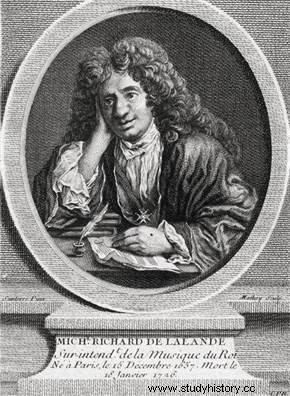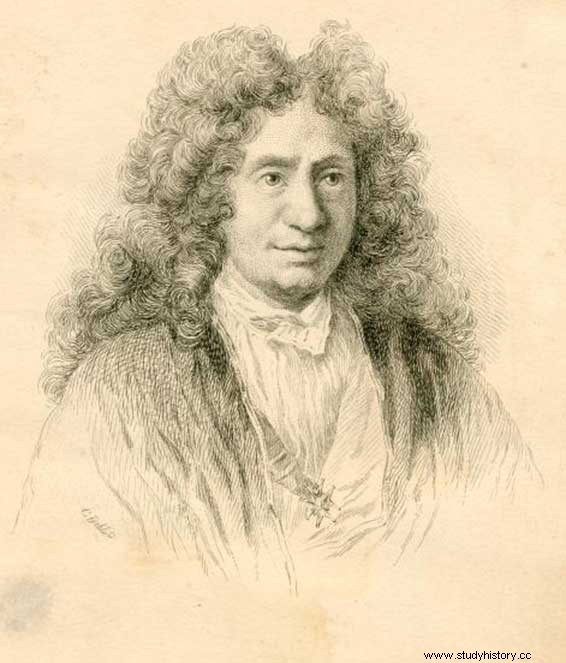 Great French musician, nicknamed the "Latin Lully" Michel-Richard De Lalande embodies the French Baroque in his violin and organ pieces. A composer, he is mainly known for his sacred work, made up of motets for the king's mass, inspired by Latin texts taken from the Psalms. Becoming master of the grand motet, his fame will be still great until the Revolution. But he also creates entertainments such as ballets, pastorals.
Great French musician, nicknamed the "Latin Lully" Michel-Richard De Lalande embodies the French Baroque in his violin and organ pieces. A composer, he is mainly known for his sacred work, made up of motets for the king's mass, inspired by Latin texts taken from the Psalms. Becoming master of the grand motet, his fame will be still great until the Revolution. But he also creates entertainments such as ballets, pastorals.
Biography of Michel-Richard De Lalande
Michel-Richard De Lalande was born on December 15, 1657 having 14 brothers and sisters before him. His father being a master tailor in the parish of Saint Germain l'Auxerrois, at the age of ten he went to sing there in the choirs directed by François Chaperon, while learning letters. Practicing the violin in 1672, he regrets not being admitted to the Lully Music Academy. He then became an organist and performed in four churches in Paris between 1670-1680:Saint Germain where he acted as interim for François Couperin until 1686, Petit Saint Antoine, Saint Paul and in 1682 Saint Jean de Grève.
 Luck turns and François Chaperon calls him to participate in the Leçons de Ténèbres de la Semaine Sainte in 1680. At the same time, he was a harpsichord teacher with Marshal de Noailles and also instructed princesses such as Madame de Montespan, Mademoiselle de Nantes, Mademoiselle de Blois. Esteemed by the king, he created his first secular music for the entertainment of the Court. He became sub-master by quarter at the Royal Chapel in 1683, and spent his entire career there, obtaining the second, third and fourth quarters every 10 years until 1714. Married in 1684 to Anne Rebel, he succeeded Lully at title of 1st musician of the Court in 1685 and composed the Epithalame for the marriage of the Duke of Bourbon and Miss de Nantes. During the carnival of 1686, he supplanted Lully with his Ballet de la Jeunesse. Composer of the chamber in 1690, he was finally recognized and obtained the highly prized position of Superintendent of Chamber Music from 1689 to 1719.
Luck turns and François Chaperon calls him to participate in the Leçons de Ténèbres de la Semaine Sainte in 1680. At the same time, he was a harpsichord teacher with Marshal de Noailles and also instructed princesses such as Madame de Montespan, Mademoiselle de Nantes, Mademoiselle de Blois. Esteemed by the king, he created his first secular music for the entertainment of the Court. He became sub-master by quarter at the Royal Chapel in 1683, and spent his entire career there, obtaining the second, third and fourth quarters every 10 years until 1714. Married in 1684 to Anne Rebel, he succeeded Lully at title of 1st musician of the Court in 1685 and composed the Epithalame for the marriage of the Duke of Bourbon and Miss de Nantes. During the carnival of 1686, he supplanted Lully with his Ballet de la Jeunesse. Composer of the chamber in 1690, he was finally recognized and obtained the highly prized position of Superintendent of Chamber Music from 1689 to 1719.
He lost his 2 daughters in 1711 and his wife in 1722. The same year, the Regent offered him the Order of Saint Michael. He remarried in 1723 with Marie Louise Cury, daughter of a Conty surgeon, but died three years later on June 18, 1726 in Versailles. His last daughter will ensure the survival of his works by having his motets published, accompanied by a biography written by Colin de Blamont.
The works of De Lalande
All his compositions are listed in three manuscripts:that of Philidor in 1689 requested by Louis XIV, an engraved edition made after his death by his second wife, a manuscript of Cauvin established in 1742 with about forty motets.
Sacred music is the most important part of his work. De Lalande composed around 75 motets, including the Beati quorum thanks to which he became sub-master of the chapel in 1683, the Te deum in 1684, the most performed during his lifetime, the Miserere in 1687, and finally the famous De profundis in 1689. and the famous 3rd Lesson of Darkness on Good Wednesday, Thursday and Friday. By 1770, his motets had been performed over 600 times at the Concerts Spirituels.
Alongside religious music, he dabbled in secular music by composing symphonies, ballets, entertaining and light works, including the Symphonies for Suppers du roi – suite of dances taken from fashionable operas, La Serenade in 1682, the Fountains of Versailles and the Concert of Aesculapius in 1683, the Ballet of Youth and Love bent by constancy.
Colin de Blamont spoke of his teacher in these words:"Mr. noble expression, always emphasizing the words he had to deal with, rendering the true meaning... Here, learned and deep, there simple and natural, he did all his study and put all his application to touch the soul by the richness expression, and vivid paintings…”
To go further
- Michel Richard Delalande – Norbert Dufourcq. Editions Picard, 2000.
- CD “Te Deum” by William Christie - Les Arts Florissants
- Box 200 years of music at Versailles CD n° 5 "Symphonies for the King's suppers"; CD n° 14 “The Folies of Cardenio”
